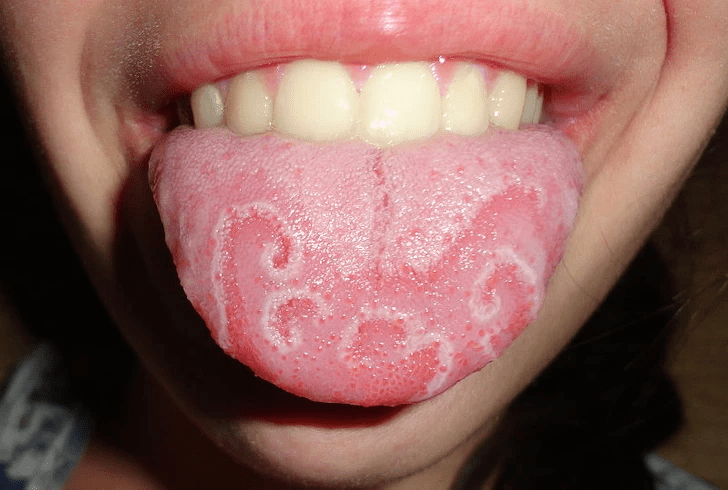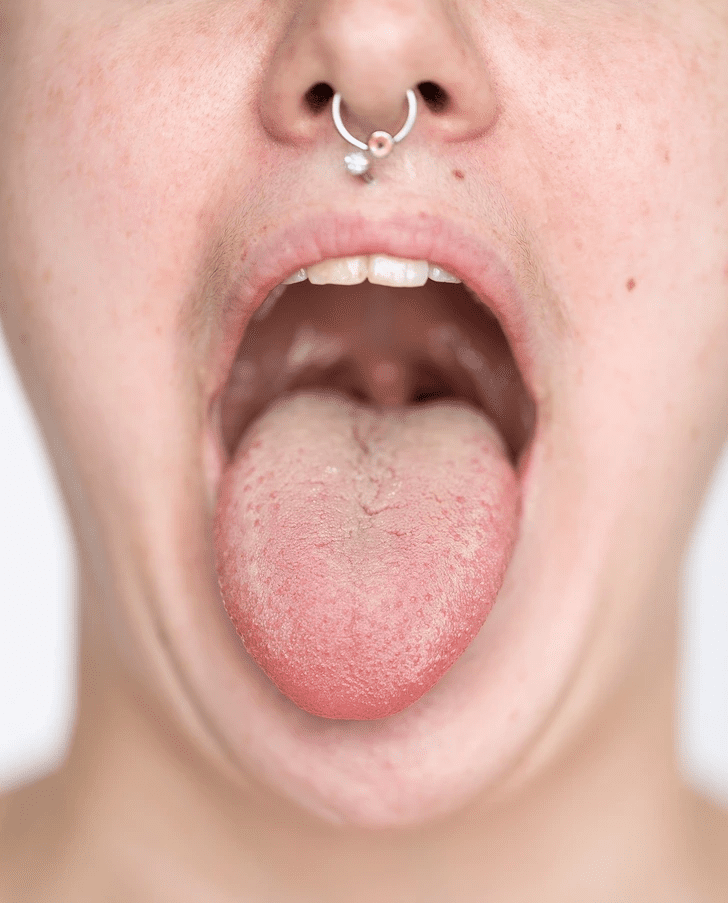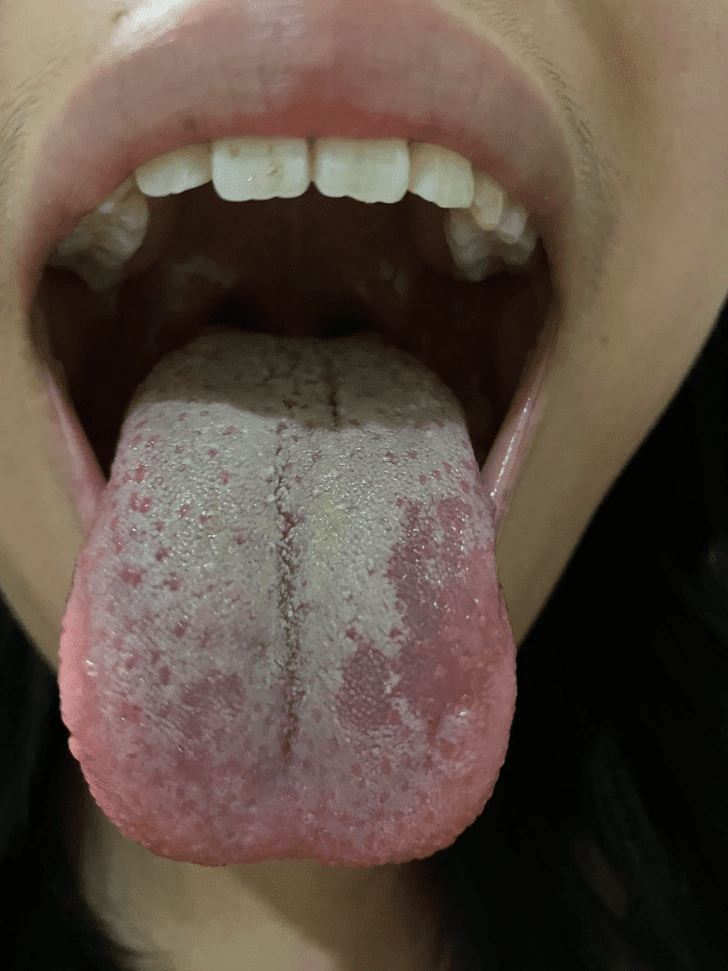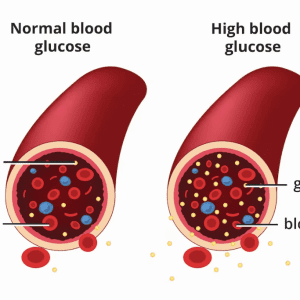Have you ever noticed your tongue looking white when you peek in the mirror? While it might seem like a minor issue, a white tongue can actually reveal a lot about your health. Sometimes it’s harmless, but other times it could be a sign of something more serious. In this article, we’ll explore the causes of a white tongue, why it happens, and how you can treat it naturally.
What Is a White Tongue?

A white tongue appears when a white coating or patches form on the surface of the tongue. This coating might cover the entire tongue or appear as spotty patches. Sometimes, it can even resemble tiny white “hairs” on your tongue, which are actually inflamed taste buds trapping food particles, bacteria, and dead cells.
You might also notice other symptoms like a dry mouth, an unpleasant odor, or a bitter taste. While most cases are harmless and temporary, persistent or painful white patches can indicate a more serious issue.
Video:
5 White Tongue Causes and Natural Treatments
Normally, a healthy tongue appears pink and moist. However, a white, yellow, or brown coating can indicate various health problems. For instance, a yellow tongue may hint at liver issues, while a red tongue might point to a vitamin B deficiency.
Why Does Your Tongue Become White?
The primary reason for a white tongue is the buildup of bacteria, food particles, and dead cells in the grooves of the tongue. This accumulation forms a pale coating that’s hard to miss. However, it’s not always just about debris—sometimes, it’s due to an underlying condition.
Here are some common causes of a white tongue:
- Oral Thrush: A fungal infection caused by Candida overgrowth.
- Dehydration: A lack of water can dry out your mouth, encouraging buildup.
- Poor Oral Hygiene: Failing to clean your tongue regularly can lead to white plaque.
- Geographic Tongue: A harmless condition where parts of the tongue lose their normal coating, forming a map-like pattern.
- Smoking: Tobacco use can irritate the tongue, leading to discoloration.
- Medications: Some antibiotics and corticosteroids can disrupt the natural balance of bacteria in the mouth.
Other factors include aging, a weakened immune system, poor diet, and dental devices like ill-fitting dentures.
Oral Thrush: A Common Culprit

One of the most frequent causes of a white tongue is oral thrush, also known as candidiasis. This fungal infection results from an overgrowth of Candida, a yeast naturally present in the mouth.
Oral thrush often presents as creamy white lesions on the tongue, gums, or inner cheeks. It may cause redness, soreness, and difficulty swallowing. Those at a higher risk include people with weakened immune systems, diabetes, or those on antibiotics.
The good news is that tongue thrush is treatable with antifungal medications. Practicing good oral hygiene and limiting sugary foods can help prevent its recurrence.
Tongue Piercings and White Tongue
If you’ve recently gotten a tongue piercing, don’t worry if you notice a white coating around it. Piercings increase bacteria in your mouth, which is normal during the healing process.
To keep your piercing clean and reduce the white coating, use an antibacterial mouthwash. Also, avoid spicy and acidic foods that can cause irritation. If the white film lasts more than two weeks or is accompanied by pain, consult a healthcare professional.
Natural Ways to Treat a White Tongue

Tired of seeing white patches on your tongue? Here are some natural remedies to help you clear it up:
- Brush Your Tongue: Use a soft toothbrush to gently scrub your tongue during your oral care routine. This helps remove bacteria and debris.
- Use a Tongue Scraper: A tongue scraper is specifically designed to clean the tongue’s surface and reduce buildup.
- Stay Hydrated: Drinking enough water can prevent dry mouth and minimize the accumulation of dead cells.
- Saltwater Rinse: Gargling with warm salt water can cleanse your mouth and reduce bacteria.
- Maintain Good Oral Hygiene: Brush twice a day, floss, and use a fluoride mouthwash.
- Avoid Irritants: Cut down on spicy, salty, or acidic foods that can inflame your tongue.
- Eat a Balanced Diet: Include plenty of fruits, vegetables, and foods rich in vitamin B12 and iron to support oral health.
These simple practices can help eliminate the white coating and prevent its return. Consistency is key—keep up your oral care routine, and you’ll likely see improvement within a few days.
When to See a Doctor

While most cases of a white tongue are harmless, there are situations where professional advice is necessary. See a doctor or dentist if:
- The white coating lasts more than two weeks.
- You experience pain, swelling, or difficulty eating or speaking.
- The white patches are accompanied by red, sore areas.
- You have an underlying health condition or a compromised immune system.
A healthcare professional can identify whether the white tongue results from a harmless cause or a more serious issue like oral cancer or a systemic infection.
Video:
11 Natural Treatments for White Tongue
Preventing White Tongue with Lifestyle Changes
The best way to deal with a white tongue is to prevent it from occurring in the first place. Incorporate these lifestyle tips to maintain a healthy, pink tongue:
- Limit Sugary Foods and Drinks: Sugar feeds harmful bacteria and yeast.
- Quit Smoking: Tobacco irritates your tongue and increases bacterial buildup.
- Practice Mindful Eating: Chew food thoroughly and stay hydrated to wash away debris.
- Regular Dental Checkups: Routine cleanings can address any potential oral health issues.
Conclusion

A white tongue can be more than just a cosmetic issue—it might signal something about your overall health. Whether it’s caused by poor oral hygiene, dehydration, or a fungal infection, addressing the root cause is essential for proper treatment.
Fortunately, most cases of white tongue are easily managed with natural remedies and better oral care. By staying hydrated, brushing your tongue, and eating a balanced diet, you can keep your tongue healthy and pink.
Pay attention to your tongue—it can give you important clues about your health. If the white coating doesn’t go away or is accompanied by discomfort, don’t hesitate to seek medical advice. Your tongue’s health is a reflection of your overall well-being!


